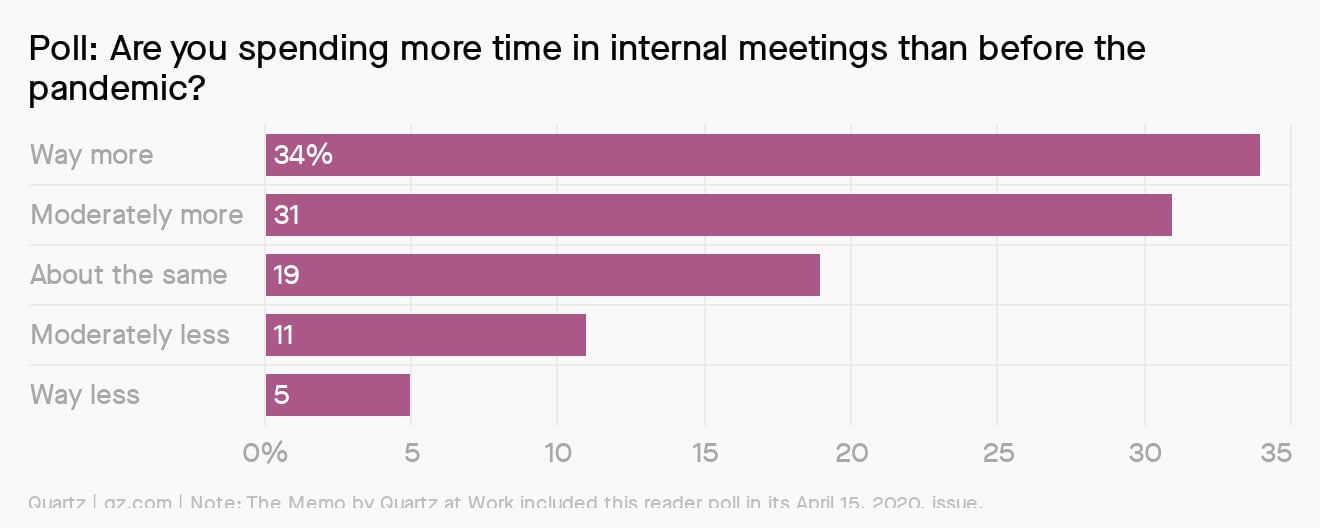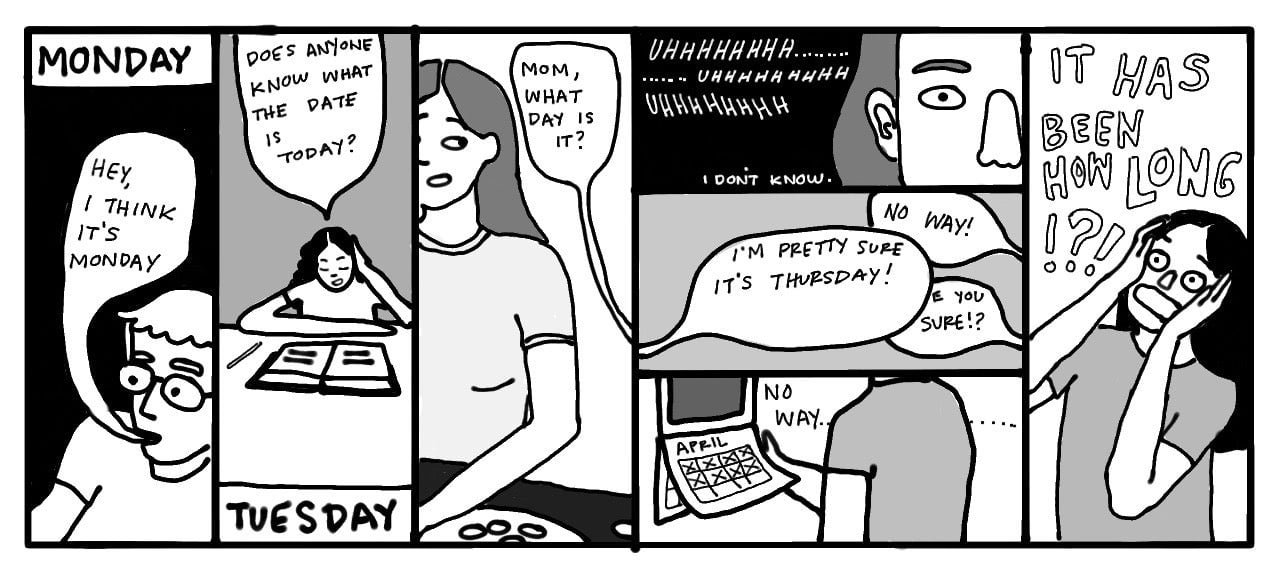The Memo from Quartz at Work: As time goes by
To modern workers everywhere,

To modern workers everywhere,
There aren’t many other life experiences that can be compared to quarantining, especially when it comes to the pace: Every day is interminable, yet the hours fly by.
Chronemics, or the study of time as a form of communication, helps explain the paradox. Dawna Ballard, a chronemics expert at the University of Texas at Austin, says time seems to be moving differently now because we’ve added tasks to our day that we never had to think about before. Instead of just remembering to get the mail, we have to decide if we need gloves for handling it or whether we should let it sit for 24 hours before we go through it. And that’s on top of all the other major demands and changes in routine brought on by the pandemic: the cooking, the homeschooling, the Zooming.
All of these “inputs,” says Ballard, quicken our pace—there’s simply more to get done in the same number of hours we always had. At the same time, a sense of slowness comes from the density of new inputs. On a typical day, you might only make 10 new decisions. But “on any given day during the pandemic, you might have literally made a hundred decisions,” says Ballard, “and that’s why the day feels like a month.”
And yet spending 30 extra minutes and abnormally high amounts of cognitive energy preparing for your trip to the grocery store doesn’t cross anything off your to-do list besides “get groceries.” Indeed, most of these new inputs don’t count in our assessments of our own productivity. That’s partly because they’re not part of our actual jobs. They’re just “background” to our roles as employees or partners or parents, and they do not come with rewards—except for the not-insignificant fact that we get to stay safe for another day.—Lila MacLellan
The concept of work-sharing is gaining momentum in many countries.
Covid-19 could help gender equality in the long run.
Your company needs a podcast.
The US unemployment rate is about to become useless.
30-second case study
Only one of Italy’s four major bookstore chains reopened stores on April 14, the first day it was allowed. The others chose to wait, underscoring both the different states of preparedness among the companies and the varying guidance from regional authorities. As Quartz’s Luiz Romero reports from Milan, all four book chains said they would deep-clean their stores before reopening and add cleaning shifts during commercial hours. Masks would be mandatory for staff and available to customers at three of the chains. One said it would add plexiglass dividers to its checkouts—“We are also evaluating measuring the temperature of customers at the entrance of the bookshops,” the chief operating officer of Feltrinelli said—while another chain, Mondadori, says it’s rethinking the size and placement of bookcases to create more open space.
It’s not just booksellers; as Italy begins lifting restrictions, employers in every sector are considering what they must change in the pandemic’s wake. As Luiz reports, unions are demanding safety measures from manufacturers like Fiat; they want the automaker to move machines around, add markings to the floor so workers can keep a safe distance, and allow employees to skip lunch and leave early so they can eat at home instead of in crowded canteens. Ferrari worked with virologists to help it develop a plan to restart production. An app will both update and track workers for contact tracing, and voluntary Covid-19 blood tests will be available to factory workers and their families.
The takeaway: Reopening physical workplaces is going to be a long, choppy process. Even once local lockdown rules have been relaxed, it will be up to individual employers to decide if they are ready to get back to business and find a new normal that keeps employees and customers safe. Ferrari’s reopening plan is cleverly named Back on Track. No doubt there are challenging curves ahead for employers all over Italy, and the globe.
It’s a fact
Unemployment claims in the US have spiked, but so has the number of people who have stopped looking for work. A new study finds that the precipitous drop in labor-force participation, which has fallen from 64.2% to 56.8%, can be explained almost entirely by early retirements.
Poll: Ready or not
If you were asked to work in an office tomorrow, would you show up?
+ Last week’s survey results suggest that Hugo co-founder Darren Chait was absolutely correct that Covid-19 has been rough on our calendars.

Words of wisdom
“The glimmer of hope I am clinging to in trying times is that the pretending ends for good, that this global crisis liberates us from our post-industrial hangover of humans as resources, as pieces of the organizational machine, without families or feelings.”—Kit Krugman, head of organization and culture design, co:collective
+ Read Kit’s full article on the welcome collapse of “professionalism”
Special to Quartz members
Eric Ries, the Silicon Valley entrepreneur and influential author of The Lean Startup, has been fielding calls since the start of the pandemic from CEOs who are wondering what to do next. In this interview with Quartz at Work senior reporter Lila MacLellan, Ries shares his advice on building resiliency and explains why he’s more impressed with employees than CEOs when it comes to responses to the pandemic. Readers of The Memo are eligible for 40% off the first-year Quartz membership price of $99. Sign up for membership here.
ICYMI
If you’re having trouble sleeping during quarantine, you might want to limit your caffeine intake. But if you still need the pick-me-up, it can’t hurt to ponder that cup. Research from 2019 suggests that merely thinking about coffee can perk up the mind and improve focus, at least for people who see a connection between coffee and alertness or productivity.

You got The Memo!
Our best wishes for a productive and creative day. Please send any workplace news, comments, early-retirement plans, or coffee thoughts to [email protected]. Get the most out of Quartz by downloading our app and becoming a member. This week’s edition of The Memo was produced by Heather Landy and Holly Ojalvo. Cartoon by Hailey Morey.